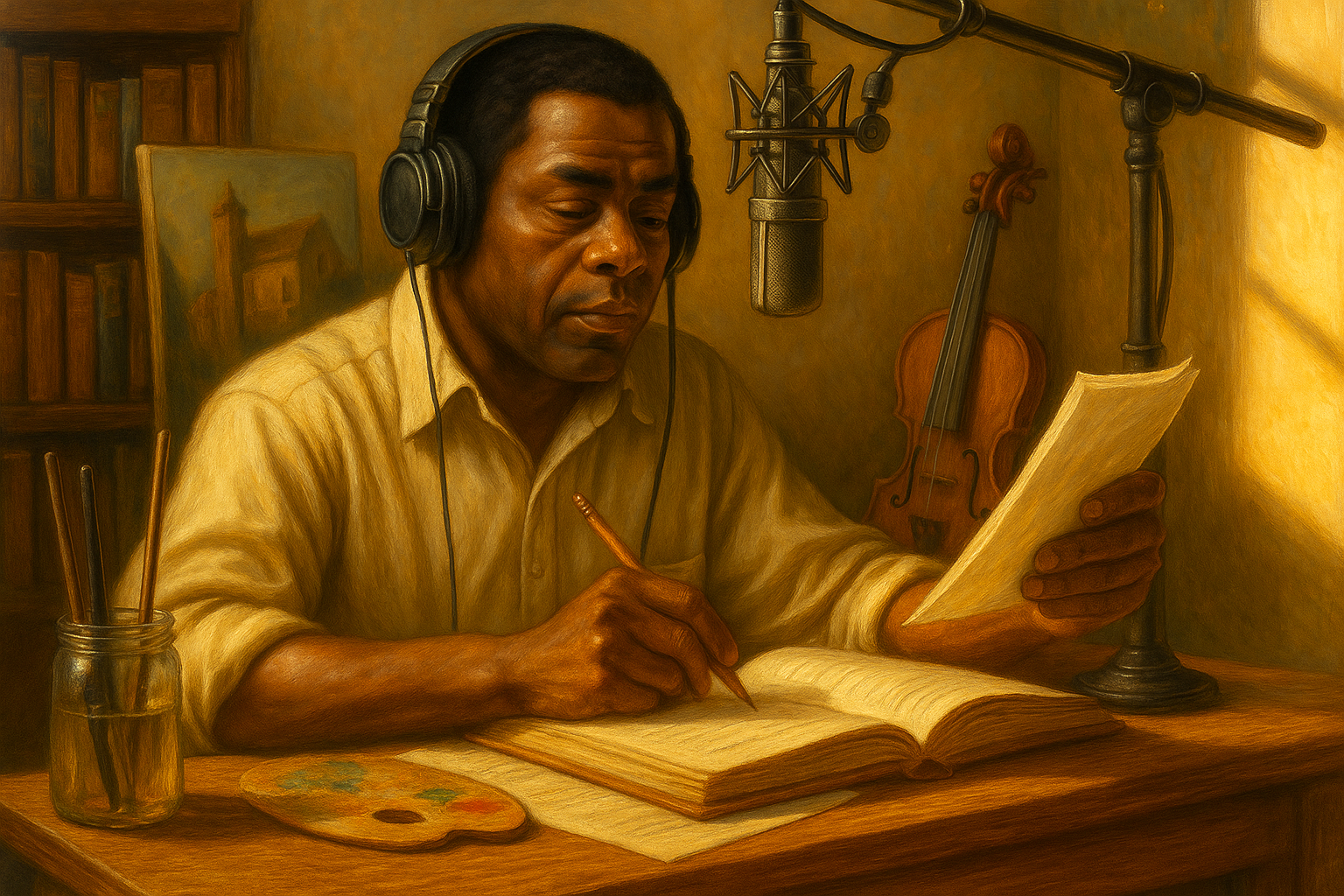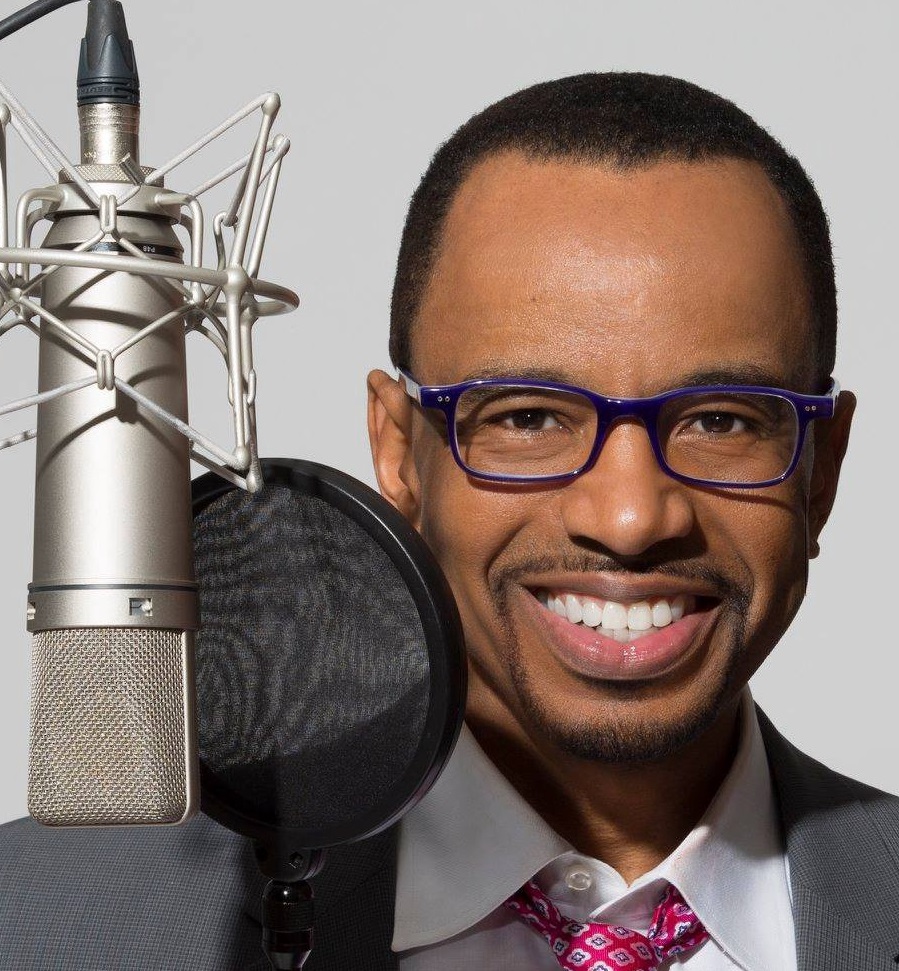A Jack of Many Voices:
Embracing Versatility Without Losing Your Creative Soul

By Rudy Gaskins, 11/2/2025
There’s an old saying that goes, “A jack of all trades, master of none.” For years that phrase was used as a warning against spreading yourself too thin, as if learning more than one craft were a sign of weakness. But the longer and truer version of that proverb has a very different meaning: “A jack of all trades is a master of none, but oftentimes better than a master of one.” That addition changes everything. It honors versatility and curiosity. It suggests that knowing a little about many things can make us wiser, more flexible, and more resilient.
I remember wrestling with the original phrase as a teenager and young adult, trying to figure out what I wanted to be in life, carrying it like a quiet warning in the back of my mind. I felt guilty for wanting to explore so many directions, as though curiosity itself were a distraction from real success. Part of me worried that pursuing multiple skills and interests might lead me down the same path as those cautionary tales we hear about, people who tried everything and mastered nothing. But another part of me couldn’t ignore the pull to learn, to experiment, to grow. It took years, and a bit of living, to realize that this instinct wasn’t a weakness at all. It was the beginning of a broader kind of mastery, one that values connection, adaptability, and depth over narrow perfection.
It feels especially relevant now as the world around us evolves faster than ever. New technologies, new apps, new learning curves; everywhere we turn, something demands our attention and adaptation. Like it or not, all of us are becoming jacks of many trades. For voice actors, this is not just a reality, it’s a necessity.
There was a time when a voice actor could focus almost entirely on performance. If you had a good voice, solid training, and a great demo reel, that was often enough. You could walk into a studio, do your job, and leave with the satisfaction of a clean take and a paycheck.
Today, that landscape has changed completely. To thrive now, voice actors must be more than performers. They are also their own engineers, marketers, brand ambassadors, social media managers, and customer service representatives. They need to understand acoustics, editing software, recording platforms, and even the ways AI is beginning to shape the industry. And while it can feel like juggling a dozen roles at once, this has simply become the new normal.
At first glance, this might sound exhausting, but it doesn’t have to be. The goal isn’t to master everything. The goal is to become adaptable, to understand enough about each area that you can move with confidence and maintain control of your creative life. The key is balance. Diversification should enhance your craft, not drain it.
When we talk about diversifying as voice actors, we’re really talking about expanding what we already do well. Acting sits at the center of everything, but around it are many connected skills waiting to be explored. Learning basic audio engineering, for example, helps you deliver clean, professional recordings without overly relying on hiring outside help. Developing marketing and branding skills lets you communicate who you are in an authentic way so clients and collaborators understand your unique value. Understanding business management helps you stay organized and build relationships that turn one-time clients into long-term partners. Learning to navigate technology keeps you relevant as new tools emerge.
Diversification also means embracing change without losing yourself to it. It can mean saying yes to growth, but no to burnout. It’s easy to get caught in the endless race to update software, refresh demos, and chase trends. But creative growth needs rest too. Voice acting is deeply emotional work. Your voice carries not only words but also energy, presence, and humanity. To keep that alive, you must protect your well-being.
So how do we expand our skill sets while preserving our quality of life? Start by defining what truly matters to you. What kind of stories do you want to tell? What kind of work makes you feel most alive? Use that as your compass. Every new skill should serve that vision, not distract from it. You can’t do everything at once. Instead, try dedicating small, focused periods of time to learning. Ten or fifteen minutes a day of new study or practice can lead to enormous progress over time.
And you don’t have to do it all alone. Collaboration is one of the most sustainable ways to grow. Work with engineers, coaches, and peers who can fill in your gaps while you offer what you do best. Teamwork multiplies skill, reduces stress, and reminds you that this is a community, not a competition. Protect your creative energy like a valuable instrument. Give it rest. Step away when you need to. Go outside. Live life. The vitality of your performances depends on it.
When you start to see yourself as a multifaceted artist, you realize how many natural extensions already exist within your craft. Many voice actors move into acting on camera or on stage, where they deepen their emotional range and physical awareness. Others find fulfillment in coaching, helping new talent find their own voices. Some explore dialect training, languages, or speech improvement, broadening their range for international work. Others lean into writing, directing, or producing, skills that help them understand story from every angle. Some discover that their technical knowledge of sound engineering opens doors to editing, demo production, or audio consulting. Still others bring their voice into the world of public speaking, podcasting, or hosting events, connecting with audiences directly. Each of these paths builds upon the foundation you already have.
But diversification can reach even further than the voice booth. Many of the qualities that make you a strong performer, such as empathy, timing, and storytelling, are also invaluable beyond traditional voice work. You might find creative satisfaction in writing copy, producing podcasts, developing educational content, or consulting for companies that use voice technology. Some performers discover joy in teaching workshops, mentoring students, or building their own media platforms where they can create original content. Others launch small creative businesses, manage production teams, or write books that share what they’ve learned along the way. These endeavors don’t replace the craft of performance; they sustain it. They offer new perspectives, build financial stability, and feed your creativity in unexpected ways.
Technology, especially AI, is changing the landscape rapidly. It can feel threatening at times, but it can also be an ally. While we continue the fight to stop the unethical practices of the companies behind AI, we can also learn to use it carefully, ethically, and creatively. AI-assisted tools can help clean audio, automate editing, and even generate new opportunities for interactive storytelling. And then there’s the innovation you may create, something no one else has imagined. The important thing is to stay informed and keep humanity at the heart of the work. Technology may replicate sound, but it cannot replicate soul. The voice of a real human being carries intention, emotion, and meaning that no algorithm can truly match.
Diversification, at its best, is about empowerment. It’s about realizing that you are not at the mercy of an unpredictable industry. You are an active participant in shaping your path. The goal is not to work endlessly but to work wisely, to build a life that supports both your art and your well-being. The most successful voice actors I know are not the busiest but the most balanced. They understand that their artistry depends on the richness of their lives outside the booth.
If there’s a single message that runs through all of this, it’s that we are living in a time where versatility is not a compromise. It is a strength. Being able to wear multiple hats is not about doing more, it’s about understanding more, seeing more, and connecting more deeply with the work. The voice actor who learns, adapts, and stays curious becomes not just a survivor in this evolving industry, but a leader in it.
If the old proverb were rewritten for today’s world, it might sound something like this: “A jack of many voices, master of the moment.” That, to me, captures what modern voice acting is all about. It’s about presence, adaptability, and authenticity. It’s about knowing when to lean into your craft, when to expand your skill set, and when to simply breathe.
At the heart of everything, voice acting remains what it has always been: the art of giving life to words through the human voice. And in a world full of changing tools, platforms, and expectations, the most timeless skill of all is still the ability to connect, to move, and to tell a story that feels alive.
So as you grow, learn, and diversify, remember this simple truth: your voice is not just your instrument, it’s your identity. Use it not just to perform, but to shape the world around you, one word, one story, and one new skill at a time. ♦︎♦︎♦︎
 Rudy Gaskins is the CEO and co-founder of the Society of Voice Arts and Sciences (SOVAS), a nonprofit organization dedicated to supporting the global community of voice actors and the professionals who contribute to the voice acting industry. I have co-created That’s Voiceover!™ Career Expo and the Voice Arts® Awards . Rudy is an Emmy Award-winning TV producer and documentary filmmaker, with a career spanning PBS, ABC News, NBC Sports, Court TV, and Food Network. His natural talent for advertising led him to become Vice President of Creative Services at Court TV, after which he founded Push Creative Advertising, offering branding services for major global brands such as American Express, Lexus, NBC Sports, Delta Air Lines, Costco, Food Network, BET, and TV One. He has received numerous awards across the media spectrum, including multiple Telly and Promax awards. Under his leadership, SOVAS has been honored with Special Congressional Recognition from the United States Congress, a Certificate of Merit from the New York State Assembly, a City Council Citation from The Council of the City of New York, and the prestigious Barry Cronin Award from the American Council of the Blind for Audio Description Talent Promotion.
Rudy Gaskins is the CEO and co-founder of the Society of Voice Arts and Sciences (SOVAS), a nonprofit organization dedicated to supporting the global community of voice actors and the professionals who contribute to the voice acting industry. I have co-created That’s Voiceover!™ Career Expo and the Voice Arts® Awards . Rudy is an Emmy Award-winning TV producer and documentary filmmaker, with a career spanning PBS, ABC News, NBC Sports, Court TV, and Food Network. His natural talent for advertising led him to become Vice President of Creative Services at Court TV, after which he founded Push Creative Advertising, offering branding services for major global brands such as American Express, Lexus, NBC Sports, Delta Air Lines, Costco, Food Network, BET, and TV One. He has received numerous awards across the media spectrum, including multiple Telly and Promax awards. Under his leadership, SOVAS has been honored with Special Congressional Recognition from the United States Congress, a Certificate of Merit from the New York State Assembly, a City Council Citation from The Council of the City of New York, and the prestigious Barry Cronin Award from the American Council of the Blind for Audio Description Talent Promotion.














Add Comment